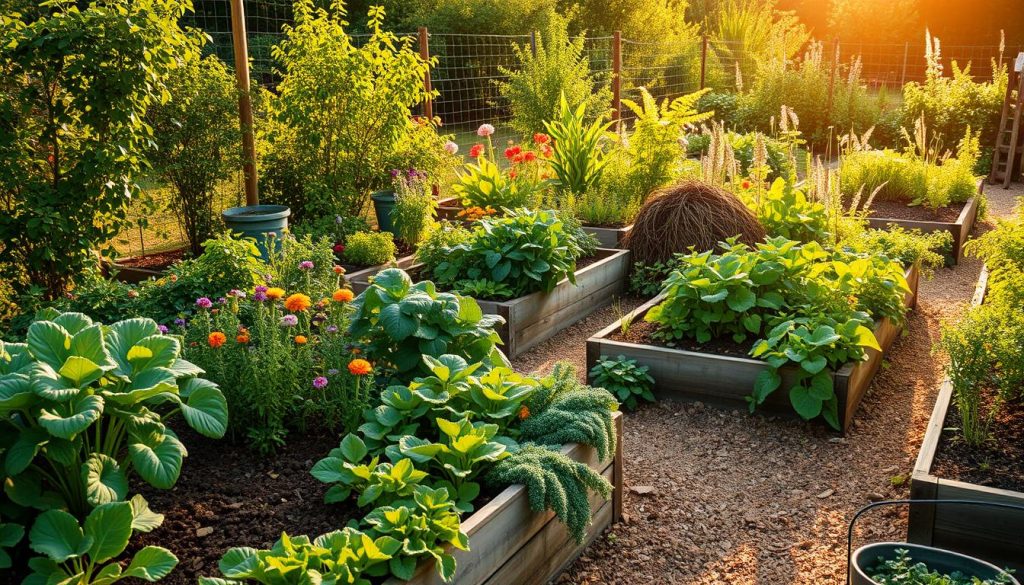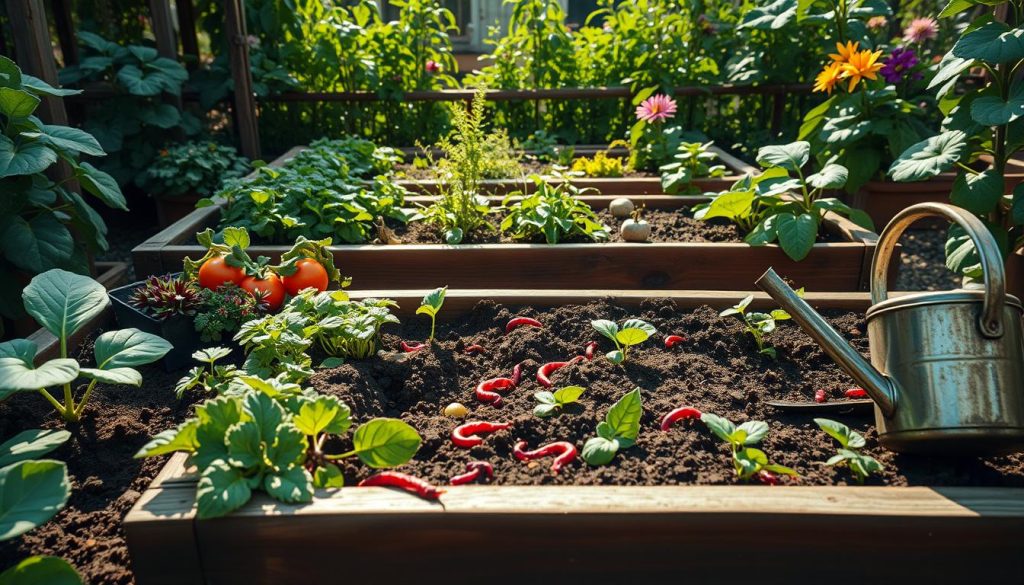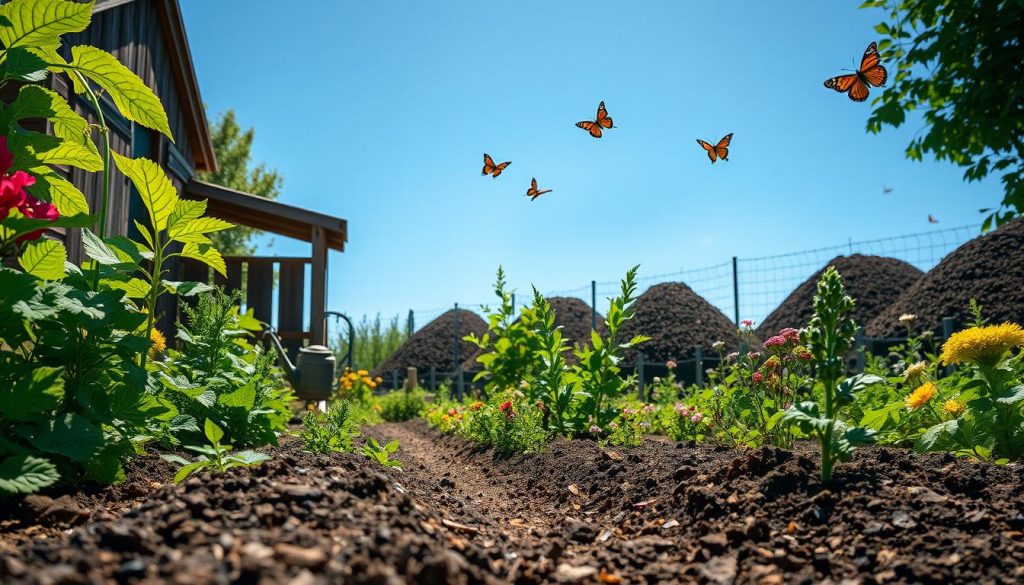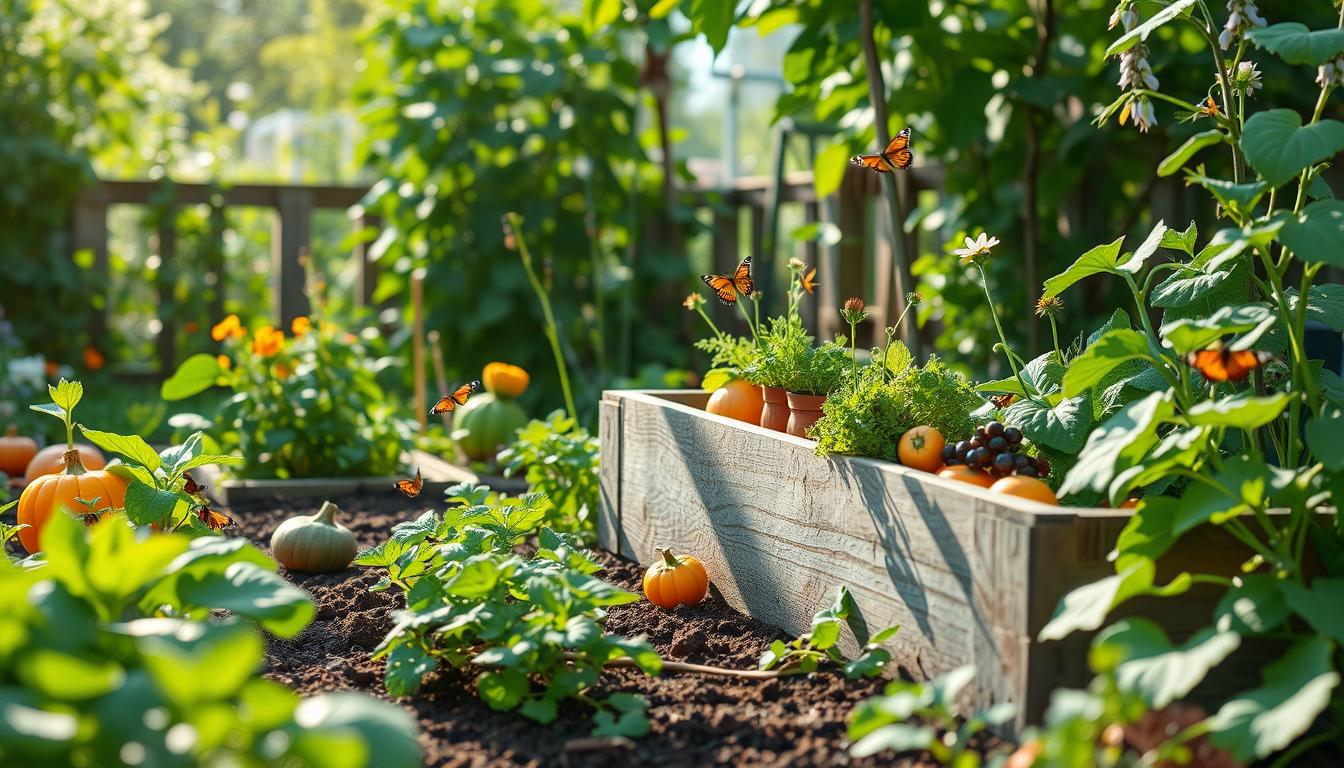I’m excited to share my journey of starting an organic garden. I hope to inspire you to start too. Organic gardening is perfect for beginners, and with the right tips, anyone can succeed.
Starting an organic garden needs the right mindset and tools. It requires patience, dedication, and a willingness to learn. By following simple tips, you can quickly learn the basics and enjoy homegrown produce.
As I began my journey, I learned the importance of understanding organic gardening basics. Choosing the right location and selecting the best soil are key. I’m excited to share my experiences and tips with you. Let’s start our organic gardening journey together.
Understanding the Basics of Organic Gardening
Exploring organic gardening is exciting. It’s about working with nature to create a balanced garden. This method uses natural ways to fight pests and diseases, like crop rotation and organic fertilizers.
Starting with organic gardening basics is key. A beginner’s guide should cover organic gardening essentials. This includes using natural fertilizers and pest control. These practices help build a strong organic garden.
What is Organic Gardening?
Organic gardening focuses on soil health and natural resources. It aims to create a self-sustaining garden. This approach minimizes external inputs and promotes ecological balance.
Benefits of Organic Practices
Organic gardening improves soil and increases crop yields. It also reduces environmental impact. Plus, it offers a wider variety of fruits and vegetables and a deeper connection to nature.

Common Myths About Organic Gardening
Organic gardening is often misunderstood. Some think it’s more time-consuming or expensive than other methods. But, with the right knowledge, it can be rewarding and cost-effective.
Getting Started with My First Garden
I’m excited to share my journey in organic gardening. Choosing the right spot for your garden is key. I look at sunlight, soil quality, and how easy it is to get to. This ensures my garden gets off to a great start.
For a beginner-friendly garden, pick a spot that gets at least six hours of sunlight. Soil quality matters a lot. I test mine to see its pH level and nutrient content. This helps my plants grow well. You’ll need a garden fork, watering can, and compost bin to get started.

Choosing the Right Location
- Assess the sunlight and shade patterns in your garden
- Test your soil to determine its pH level and nutrient content
- Consider the accessibility of your garden for easy maintenance
Selecting the Best Soil for Plants
For the best soil, look for one that’s rich in organic matter and drains well. Think about what plants you want to grow, like tomatoes or herbs. This way, you can make soil that meets their needs.
Tools I Need for Organic Gardening
Key tools include a garden fork, watering can, and compost bin. They help me prepare soil, water plants, and make compost. With these tools and some knowledge, I can grow a healthy garden using organic methods.
Plant Selection and Companion Planting
Choosing the right plants is key to a successful organic garden. As a beginner, pick plants that are easy to grow and need little care. Companion planting is a great way to boost your garden’s health and productivity. It involves planting different species together to fight pests and increase yields.
For beginners, there are many resources to help start an organic garden. Online tutorials and gardening communities offer valuable advice. The National Gardening Association and Organic Gardening website are great places to learn more.
Identifying the Best Plants for Beginners
When picking plants, consider your garden’s climate, soil, and sunlight. Tomatoes, cucumbers, and herbs like basil and mint are great for beginners. They grow well in many conditions.
What is Companion Planting?
Companion planting means growing different plants together to improve growth and fight pests. It helps create a balanced garden ecosystem. For example, marigolds can keep nematodes away from tomatoes, and beans help corn grow better.
My Favorite Companion Planting Combinations
- Tomatoes and basil: This classic combo is great for gardens. Basil keeps pests away from tomatoes and adds flavor.
- Cucumbers and dill: Dill fights off aphids and other pests, and adds a fresh taste to pickling.
- Carrots and sage: Sage keeps carrot flies away and adds a savory flavor to dishes.
By using companion planting and choosing the right plants, you can create a thriving garden. With the right resources and techniques, anyone can enjoy the benefits of organic gardening.
Maintaining My Organic Garden
Keeping my organic garden in top shape is just as crucial as starting it. With the right organic gardening tips, my plants stay healthy and grow well. Proper watering is key. I use drip irrigation and mulching to save water and prevent soil erosion.
Managing pests is also vital. I use natural methods to keep pests and diseases under control. This helps maintain a balanced garden ecosystem. Organic gardening basics like proper watering and soil care are essential. I’ve found compost tea and neem oil to be effective against pests. Here are more tips for keeping my garden in check:
- Observe and respond to the garden’s needs, making adjustments as necessary
- Use natural methods to control pests and diseases, rather than relying on chemicals
- Keep the garden well-watered, but avoid overwatering, which can lead to root rot and other problems
By following these tips and sticking to organic gardening basics, I get a rich harvest. With time and effort, organic gardening becomes a fun and rewarding hobby. 
Resources for Continuous Learning
I love organic gardening and always want to learn more. Luckily, there are many ways to do this. Books, websites, local groups, and workshops are all great for learning.
Books and Websites I Recommend
I read books like “The Vegetable Gardener’s Bible” by Edward C. Smith. Websites like Rodale’s Organic Life and The Spruce are also great. They teach me about soil health and organic pest control.
Joining Local Gardening Communities
Being part of a local gardening group is amazing. I’ve joined clubs and events with the Master Gardeners. It’s a great way to get advice and meet people who love gardening.
Workshops and Online Courses to Explore
I’ve taken workshops at local nurseries and gardens. They taught me about seed starting and composting. Online courses on Coursera and Udemy also help me learn more.
Using all these resources, I’m always improving my gardening skills. I’m creating a garden that’s good for my family and the planet.

